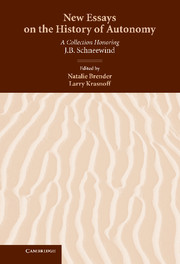Book contents
- Frontmatter
- Contents
- List of Contributors
- Acknowledgments
- Introduction
- PART ONE AUTONOMY IN CONTEXT
- 1 Justus Lipsius and the Revival of Stoicism in Late Sixteenth-Century Europe
- 2 Affective Perfectionism: Community with God without Common Measure
- 3 Autonomy and the Invention of Theodicy
- 4 Protestant Natural Law Theory: A General Interpretation
- 5 Autonomy in Modern Natural Law
- PART TWO AUTONOMY IN PRACTICE
1 - Justus Lipsius and the Revival of Stoicism in Late Sixteenth-Century Europe
from PART ONE - AUTONOMY IN CONTEXT
Published online by Cambridge University Press: 24 July 2009
- Frontmatter
- Contents
- List of Contributors
- Acknowledgments
- Introduction
- PART ONE AUTONOMY IN CONTEXT
- 1 Justus Lipsius and the Revival of Stoicism in Late Sixteenth-Century Europe
- 2 Affective Perfectionism: Community with God without Common Measure
- 3 Autonomy and the Invention of Theodicy
- 4 Protestant Natural Law Theory: A General Interpretation
- 5 Autonomy in Modern Natural Law
- PART TWO AUTONOMY IN PRACTICE
Summary
In the history of scholarship and of humanist learning, Justus Lipsius is best known for his editions with annotations of Tacitus and (later) Seneca. Indeed, his was a scholar's and professor's life, devoted primarily to the study and teaching of classical Latin literature and Roman history. He cared about nothing more – or so he repeatedly said – than to live in peace and quiet, devoting himself to his books and his students and the enjoyment of his garden, far away from the bustle of politics – and from the civil disturbances and even wars caused by the passionate religious disputes that were so prominent a feature of Northern Europe, and especially of his own country, the present-day Belgium, during his lifetime (1547–1606). He was born near Leuven into a Catholic household, was a pupil from age thirteen to sixteen at the Jesuit College in Cologne (where he began to learn Greek) and then studied law at the university of Leuven. At nineteen he became Latin secretary to the notorious cardinal Granvelle (archbishop of Malines-Brussels), whom he accompanied to Rome (1567–70), where he began his work on Tacitus. Returning to Belgium briefly, he then went to Vienna, apparently hoping for some imperial academic or scholarly appointment (his first big book of textual studies of Latin classics, Variae Lectiones, had been published by Plantin at Antwerp in 1569). In this he was disappointed.
- Type
- Chapter
- Information
- New Essays on the History of AutonomyA Collection Honoring J. B. Schneewind, pp. 7 - 29Publisher: Cambridge University PressPrint publication year: 2004
- 1
- Cited by

